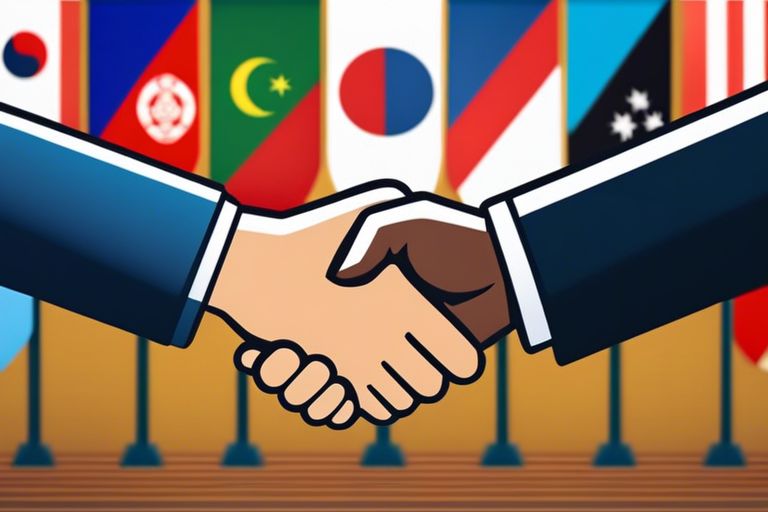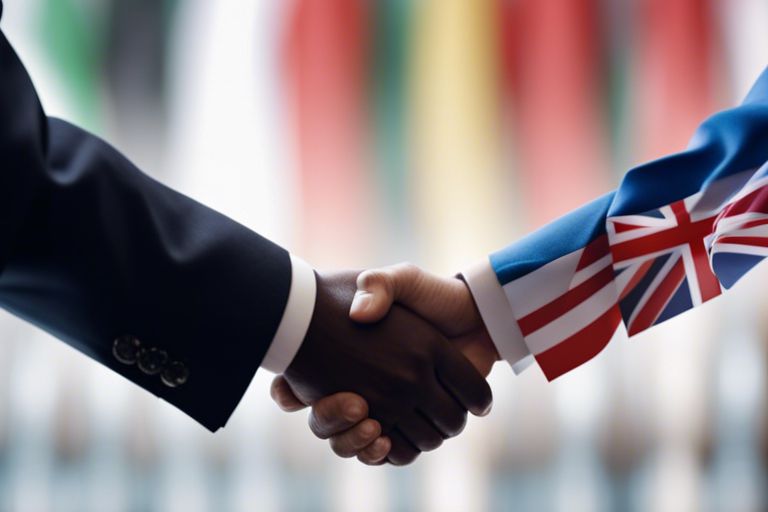It’s crucial to understand the pivotal role diplomats play in international relations. Diplomats serve as key representatives of their countries, negotiating treaties, maintaining relationships, and promoting peace. To explore deeper into the question “Who is a diplomat?” visit Who is a diplomat? for more insights.

Key Takeaways:
- Representing a nation: Diplomats serve as official representatives of their country in dealings with foreign governments and international organizations.
- Negotiating agreements: Diplomats are responsible for negotiating treaties, trade agreements, and various other international accords on behalf of their government.
- Building relationships: Diplomats work to foster positive relationships with other nations to advance their country’s interests and promote peace and cooperation.
- Gathering information: Diplomats gather intelligence and assess political, economic, and social developments in the countries in which they are stationed.
- Conflict resolution: Diplomats play a crucial role in resolving disputes between nations through mediation, negotiation, and diplomacy.
- Protecting nationals: Diplomats provide assistance and support to their citizens living or traveling abroad, ensuring their safety and well-being.
- Promoting cultural exchange: Diplomats organize cultural events, educational programs, and other initiatives to promote understanding and cooperation between countries.
Historical Context
The evolution of diplomacy
Historical records show that diplomacy has been an integral part of human interaction for centuries. In ancient civilizations like Egypt and Mesopotamia, envoys were sent to negotiate treaties and alliances. Over time, the practice of diplomacy evolved, becoming more formalized and structured.
Key milestones in international relations
On the global stage, there have been key milestones that have shaped international relations. The Treaty of Westphalia in 1648 is often considered the birth of modern diplomacy, as it established the principles of state sovereignty and non-interference in internal affairs. The Congress of Vienna in 1815 set the stage for the balance of power system in Europe, which aimed to prevent any single state from dominating the continent.
Another important milestone was the creation of the League of Nations in 1919, after World War I, which aimed to promote peace and cooperation among nations. Although it was not entirely successful, the League laid the groundwork for the establishment of the United Nations after World War II.
The Diplomat’s Role
Representation and negotiation
Negotiation is at the core of a diplomat’s role in international relations. Diplomats represent their countries in discussions and conferences with other nations to address various issues, ranging from trade agreements to peace treaties.
Communication and mediation
To foster understanding and resolve conflicts, diplomats engage in communication and mediation between parties. They act as intermediaries, ensuring that messages are conveyed clearly and diplomacy is maintained.
For instance, in a dispute between two countries over territorial claims, diplomats would facilitate dialogues and propose compromises to reach a peaceful resolution.
Crisis management and conflict resolution
Mediation becomes crucial in times of crisis when tensions escalate between nations. Diplomats work to de-escalate conflicts through negotiation, offering solutions that prevent further hostilities and promote stability in the region.
Diplomats play a pivotal role in maintaining peace and fostering cooperation among nations by skillfully navigating complex political landscapes and employing tactful communication strategies.
Types of Diplomats
Your understanding of the various types of diplomats is crucial in comprehending their roles in international relations. Diplomats can be categorized into different groups based on their roles and responsibilities. Each type plays a unique part in representing their country on the global stage. Perceiving the distinctions between these categories can provide insights into how diplomacy functions.
| Career diplomats | Political appointees |
| Special envoys |
Career diplomats
The backbone of diplomatic services, career diplomats are professionals who have dedicated their lives to representing their country’s interests abroad. They undergo rigorous training and often serve in various foreign postings throughout their careers.
Political appointees
Diplomats appointed based on political connections rather than career experience. It is crucial for political appointees to understand the nuances of international diplomacy to effectively represent their country’s interests.
To understand the role of special envoys, we must recognize their unique position in diplomatic missions. Special envoys are individuals appointed to handle specific diplomatic issues or negotiations on behalf of their government. They possess specialized knowledge and expertise in a particular area and are often tasked with resolving complex diplomatic challenges.
Special envoys
Special envoys are instrumental in facilitating communication and negotiations between countries. They serve as key intermediaries in resolving conflicts, fostering cooperation, and advancing diplomatic initiatives.
Skills and Qualities
Language proficiency and cultural awareness
On the surface, language proficiency and cultural awareness may seem like basic skills for a diplomat, but they are crucial for effective communication and relationship-building in international relations.
Analytical and problem-solving skills
Analytical and problem-solving skills are imperative for diplomats to understand complex issues, analyze various perspectives, and develop creative solutions to international challenges.
This involves the ability to think critically, identify underlying issues, and evaluate potential outcomes to make informed decisions that benefit their country’s interests while promoting cooperation with other nations.
Adaptability and flexibility
Proficiency in adaptability and flexibility is key for diplomats as they navigate through uncertain and ever-changing international situations.
Flexibility allows diplomats to adjust their strategies and approaches based on new information or unexpected developments, ensuring they can effectively represent their country’s interests and negotiate successful agreements.

Challenges and Opportunities
Globalization and its impact on diplomacy
Opportunities lie in the interconnected world brought about by globalization. Diplomats now have the chance to engage with a diverse range of actors, facilitating dialogue and cooperation on a global scale.
The role of technology in international relations
On the technological front, there are significant opportunities for diplomats to leverage tools such as social media and virtual conferencing to enhance communication and bridge cultural divides in international relations.
International diplomacy today is heavily influenced by the rapid advancements in technology. From utilizing encrypted communication for secure negotiations to leveraging big data for informed decision-making, diplomats must adapt to this digital age to effectively navigate the complexities of global politics.
Dealing with non-state actors and terrorism
Globalization presents challenges in dealing with non-state actors and terrorism. Diplomats must navigate intricate networks and collaborate closely with international organizations and governments to address security threats effectively.
Dealing with non-state actors, such as terrorist groups, requires a multi-faceted approach that combines diplomatic efforts with intelligence sharing, law enforcement cooperation, and regional partnerships to counter the evolving nature of global security threats.
Diplomatic Tools and Strategies
Despite the complexities of international relations, diplomats play a crucial role in navigating the diplomatic landscape. According to The Roles and Duties of Diplomats on Diplomatic Missions, diplomats are entrusted with representing their countries and advancing their interests through various tools and strategies.
Bilateral and multilateral agreements
Agreements between nations are vital diplomatic tools for establishing shared commitments and regulations. These agreements can be either bilateral, involving two countries, or multilateral, with the involvement of multiple nations. They help foster cooperation, resolve conflicts, and promote mutual benefits between the parties involved.
Economic sanctions and incentives
Any diplomacy involves the strategic use of economic measures such as sanctions or incentives to influence the behavior of other nations. Economic sanctions can range from trade restrictions to asset freezes, while incentives like trade deals or aid packages can be used to encourage cooperation and alignment with diplomatic goals.
Tools like economic sanctions and incentives are employed to advance a country’s interests and to deter undesirable actions by other nations. The effectiveness of these tools depends on various factors, including the economic leverage of the parties involved and the international support for such measures.
Public diplomacy and soft power
Power dynamics in international relations go beyond military strength and economic prowess. Public diplomacy and soft power strategies are vital tools for diplomats to shape perceptions, build trust, and garner support from foreign populations. These tools involve cultural exchanges, educational programs, and strategic communication efforts to promote a positive image and influence public opinion in other countries.
Soft power is a concept coined by political scientist Joseph Nye, referring to the ability to attract and co-opt rather than coerce, using intangible assets such as culture, values, and policies. Diplomats leverage soft power through public diplomacy initiatives to enhance their country’s reputation and build lasting relationships on the global stage.
Conclusion
On the whole, diplomats play a crucial role in international relations by facilitating communication, negotiation, and cooperation between nations. Their ability to navigate complex diplomatic issues and build relationships is imperative for maintaining peace and resolving conflicts in the global arena. Diplomats act as the primary representatives of their countries, working tirelessly to promote understanding and collaboration on the world stage.
FAQ
Q: What is the role of a diplomat in international relations?
A: A diplomat’s role in international relations is to represent their country’s interests abroad by negotiating agreements, promoting trade, defending national interests, and fostering international cooperation.
Q: What skills are necessary for a diplomat to be successful?
A: Successful diplomats possess excellent communication skills, cultural awareness, negotiation skills, language proficiency, and the ability to analyze complex political situations.
Q: How does a diplomat promote international cooperation?
A: Diplomats promote international cooperation by engaging in dialogue with other nations, building diplomatic relationships, working towards peaceful resolutions to conflicts, and facilitating agreements on various issues.
Q: What role does a diplomat play in trade relations between countries?
A: Diplomats play a crucial role in trade relations between countries by promoting economic partnerships, negotiating trade agreements, resolving trade disputes, and advocating for their country’s commercial interests.
Q: Why is cultural awareness important for diplomats?
A: Cultural awareness is important for diplomats because it helps them understand and respect the customs, values, and traditions of other nations, which is necessary for building trust and effective diplomatic relationships.
Q: How do diplomats contribute to national security?
A: Diplomats contribute to national security by engaging in diplomacy to prevent conflicts, cooperating with other countries on security issues, gathering intelligence, and participating in international efforts to combat threats such as terrorism and proliferation of weapons of mass destruction.
Q: What challenges do diplomats face in the modern world?
A: Diplomats face challenges such as maintaining diplomatic relations in times of political tension, dealing with non-state actors in international affairs, adapting to new technologies that impact diplomacy, and addressing global issues like climate change and cyber threats.